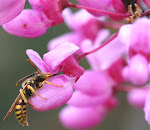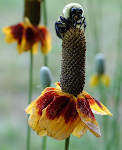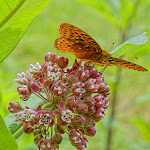Beepeople:
Drama in the hives. Last post I was worrying about foulbrood. I had settled on the strategy (learned in the book "Natural Beekeeping") of housing the queen and her workers in an entirely new, clean hive and burning the old one.
Confirmed in this plan by my mentors, I set upon this daunting task. It involved: finding the queen and picking her up (that part gave me the willies), putting her in the new box, then brushing all bees off each frame into the new hive. Lots of upset bees. Then hide all the brood and honey frames from the bees so they don't take the contagion with them, feed them sugar water, and scorch out the old boxes, etc.
I was rather depressed afterward. Even more depressed when I checked in the next day and the queen was gone!! Anguish! And only a handful of workers left.
Well good thing the hive next door (the blue hive, erstwhile Elizabeth) was fixing to swarm. Scads of workers, brood, too many drone cells, honey and - wait for it - about 10 swarm cells. Bad beekeeper! {Note to self - do NOT travel in March/April because the bees will get ahead of you!}. Elizabeth was busting out of the hive.
So I split the hive! I had to read the "unusual situations and advanced techniques" sections of all my books! I felt quite the hive rock star.
I put all the frames with swarm cells into their own new fresh box, gave them honey frames, and tried to find the old queen to leave her in the old box with lots of new brood and honey space.
Except that I couldn't find her.
There are squillions of bees in a full hive. And they are all moving around so much. And they rarely make that convenient circle around the queen all pointing at her like they do in the pictures. And she hadn't been marked {note to self: mark the dang queens}.
I shut the hives after exhaustive searching (with no veil and with magnifying glasses on; hello - bees in my hair). And prayed Elizabeth had not just got shut up in the tight new hive with all those restive swarm cells...
Upshot is: the bee goddess smiled on me. I checked in and the new hive still had swarm cells and the bees were
tense when I opened them up. High pitched whining, frantic motion, many more guards buzzing my face - I had the distinct impression they were upset and wanted the top put on
NOW. So I did.
Then I checked Elizabeth's hive and what a difference: calm, quiet, mellow bees. Happily socking away honey (a whole box in one week!). Happy making brood, no swarms cells. Amazing what a different feeling a queenless hive gives compared to a queenright hive. I was moved by the experience. So I am waiting on the new queen to hatch!
Last thing - turns out the other hive did not have foulbrood. Something was way wrong with the brood - our state apiarist happened to be at our beekeepers club meeting last week but he said, no, not foulbood. But he took one of my brood frames to be analyzed in the lab.




